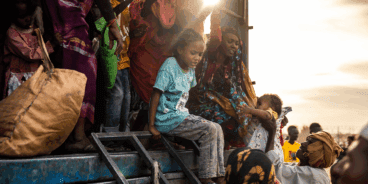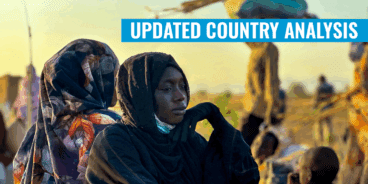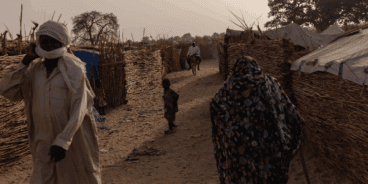
Atrocity Alert No. 95: Democratic Republic of the Congo, Central African Republic, Syria and Somalia
Atrocity Alert is a weekly publication by the Global Centre for the Responsibility to Protect highlighting situations where populations are at risk of, or are enduring, mass atrocity crimes.
Growing inter-communal violence in Democratic Republic of the Congo
Inter-communal violence continues to increase in several provinces of the Democratic Republic of the Congo (DRC). Since December tensions have been rising between the Hema and Lendu ethnic groups in Ituri province regarding the control of disputed land. At least 45 people were killed on 1 and 2 March after a major Lendu attack on the village of Maze.
The Hema and Lendu have a history of conflict, including several years of intense fighting during the late 1990s that resulted in thousands of deaths. Although the two communities have coexisted relatively peacefully since 2007, fighting during February resulted in more than 30 deaths. At least 27,000 people subsequently fled to Uganda and tens of thousands more were internally displaced. Villages in the Djugu area of Ituri province have been burnt to the ground, and refugees have reported being attacked by men armed with machetes, spears, axes and guns.
The UN Refugee Agency (UNHCR) has also warned of increased inter-communal violence in Tanganyika province between the Twa, Luba and other ethnic groups, as well as clashes between the government’s armed forces and local militias. UNHCR has reported evidence of potential atrocities in the province, including torture, murders, arbitrary arrests, forced labor, and rape. UNHCR has also warned of a possible “humanitarian disaster of extraordinary proportions” as it is currently unable to meet the increased demand for emergency assistance.
The DRC government and the UN peacekeeping mission (MONUSCO) should urgently deploy additional troops to Ituri and Tanganyika provinces in order to contain the current fighting. As the country prepares for long overdue elections to take place later this year, it is more important than ever for the government to uphold its responsibility to protect all Congolese, prevent recurring inter-communal violence, and end the predations of armed militias that operate across the country.
Humanitarian workers killed in Central African Republic
On Sunday, 25 February, six humanitarian workers were targeted and killed while traveling near the town of Markounda in northwestern Central African Republic (CAR). Armed confrontations between rival militia groups in the northwest have resulted in the forced displacement of more than 80,000 civilians along the border between CAR and Chad since the end of 2017. Over 7,000 civilians have taken refuge in Markounda to escape the violence.
Since January 2017 twenty humanitarian workers have been killed in CAR, making it one of the deadliest countries in the world for humanitarian organizations. Several agencies have had to suspend their operations due to attacks, leaving hundreds of thousands of Central Africans without life-saving humanitarian aid. This most recent attack has further jeopardized essential humanitarian and development projects in one of the most remote and neglected regions of the country.
Despite the presence of a UN peacekeeping mission (MINUSCA), approximately 70 percent of CAR still remains under the control of rival armed groups and at least one in five Central Africans is now either internally displaced or a refugee. Working with MINUSCA, the government must do more to end the culture of impunity in CAR. This must include providing enhanced physical protection to vulnerable civilians and operationalizing the Special Criminal Court. The government should prioritize the investigation and prosecution of mass atrocity crimes, including targeted attacks against humanitarian personnel.
270 civilians killed in eastern Ghouta since UN Security Council ceasefire resolution
More than a week after the UN Security Council unanimously adopted a resolution calling for a 30-day ceasefire, the Syrian government’s military offensive against the opposition-held enclave of eastern Ghouta continues. According to the Syrian Observatory for Human Rights more than 270 civilians have been killed by airstrikes and shelling since Resolution 2401 was adopted on 24 February.
In recent days Syrian government ground forces have captured numerous villages and towns in eastern Ghouta, amounting to over 40 percent of the enclave. The UN regional humanitarian coordinator condemned the ongoing violence, saying “instead of a much-needed reprieve, we continue to see more fighting, more death, and more disturbing reports of hunger and hospitals being bombed. This collective punishment of civilians is simply unacceptable.”
On Monday, 5 March, a UN and Syrian Arab Red Crescent convoy was able to deliver humanitarian aid to the town of Douma – the first delivery of aid to eastern Ghouta since 14 February. Approximately 393,000 people live in eastern Ghouta, which has been besieged by Syrian government forces since 2013. The convoy delivered food parcels, flour and medical supplies for 27,500 people. However, according to the World Health Organization, all trauma kits and surgical supplies were removed from the convoy by government forces prior to delivery, in violation of International Humanitarian Law.
On 5 March the UN Human Rights Council adopted a resolution by a vote of 29-4 calling for all parties to the conflict to uphold their responsibility to protect the Syrian population, and requesting the Commission of Inquiry on Syria to investigate the situation in eastern Ghouta. The broader international community should intensify efforts to hold all those responsible for alleged war crimes and crimes against humanity accountable, including through the UN’s International, Impartial and Independent Mechanism to assist in the investigation and prosecution of perpetrators of atrocities in Syria.
Somali civilians threatened by potential Al-Shabaab resurgence
On 2 March the troop contributing countries for the African Union Mission in Somalia (AMISOM) released a communiqué urging the UN Security Council to reconsider AMISOM’s 2020 drawdown date, stating the timeline risked a reversal of the hard-fought gains made against the armed extremist group Al-Shabaab.
Despite AMISOM and the Somali National Army having retaken 80 percent of the territory previously held by Al-Shabaab, an estimated 2 million people still live under the group’s control. Al-Shabaab was responsible for over 1,200 civilian deaths during 2017, including the killing of over 500 people in an October truck bomb attack in Mogadishu. Al-Shabaab fighters routinely violate International Humanitarian and Human Rights Law, including by deliberately targeting civilians, using civilians as human shields, recruiting child soldiers and blocking access to vital humanitarian assistance.
The premature withdrawal of AMISOM would not only pose a serious threat to the security and stability of Somalia, it would also greatly increase the risk of a recurrence of mass atrocity crimes.


Populations at Risk
